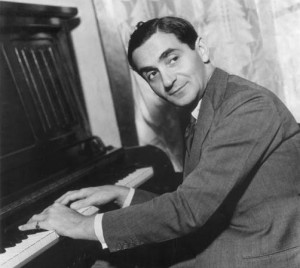Smack dab in the middle of frenetic December when I’m busy gigging and teaching and stressing out, as usual, I buy myself a front row mezzanine seat to see the Hershey Felder one-man show about Irving Berlin.
Over the years I’ve done my homework on Mr. Berlin since I often share anecdotes about the iconic songwriters and singers with my audience. I love to pull the curtains back and catch a glimpse of the real person behind the sparkly career. And honestly, being as self-centered as the next person, I want to find myself somewhere in that great artist’s story. I want to say “oh me too.”
Irving Berlin played the piano by ear. Me too! He dropped out of school in the 6th grade and busked on the street to support himself. A “real job,” as a singing waiter in a Chinese restaurant, set his trajectory for the rest of his life. Business is business and the owner wanted to get more Italians into the restaurant so Irving wrote “Marie From Sunny Italy,” his first published song, which he’d perform before delivering heaping plates of chop suey to the table. Later on he was identified in the press as “the singing waiter” even after he wrote his mega-hit Alexander’s Ragtime Band in 1911 and by age 23 was the most famous songwriter in the world.

If Irving Berlin couldn’t read or write music, how did his songs get from him to us? Today we have fancy recording devices to preserve our creative bursts of words and melody. Irving had musical secretaries who, like dictation ladies, wrote the music down as he played the piano and composed the tune.
And oh those songs… He was caught in the riptide of history, World War I, The Great Depression, World War II. But being a songwriter, he wrote songs about it. And he wrote about the death of his first wife, about his new wife and their children. He says, “I wrote for love. I wrote for my country. I wrote for you.”
The performance ends and Hershey Felder takes his final bow but doesn’t leave the stage. Uh… This is odd. He motions us to sit down, sit down, because there is a special guest in the audience and this is the first time she has seen the show.
About her father.
He introduces Linda Louise Emmet (Berlin), a spry eighty-two year old who bounds on stage and plops onto a prop chair ready to answer questions from the audience as if she is channeling Carol Burnett. I lean way forward in my seat which totally messes with the view of the man sitting behind me, but I don’t care. I’m witnessing lineage here.

She’s funny and unaffected by this whole surrealistic scene. She tells us that George Gershwin had applied for the job of musical secretary, but her father turned him down saying he was too talented and should go write his own songs. She confirms that yes, her dad played the piano in only one key, F#, the black notes, because they stick out, and yes he had a transposing piano with a ratchet device so he could play in F# but still have it sound like another key, much like guitar players use a capo or synthesizer players push a little button… Click here to watch a short video of Irving Berlin demonstrating his transposing piano.
She says pianos came like that in those days. It wasn’t anything special. Irving Berlin bought it second-hand. His daughter added that he was a terrible piano player and her mother was tone deaf. Sounds like a marriage made in heaven.
What is the soundtrack of your life? Which songs define a moment, a shift in your world? Really it’s like a movie–our lives–and the music is humming in the background giving sound and meaning to those moments. Placeholders, they are. When I work with people with dementia, a song can bring them back to life. For a moment. Irving Berlin’s “Always” which he wrote for his beloved wife of 62 years, Ellin, the young socialite with 125 servants and the very rich daddy, the good Catholic daughter who was disowned by that daddy because she married a singing waiter. The songwriter. A Jew. That song is embedded in bones and sinewy tissue because when people hear it they remember. They remember the someone they loved.
That song…


